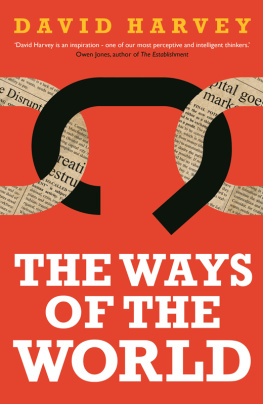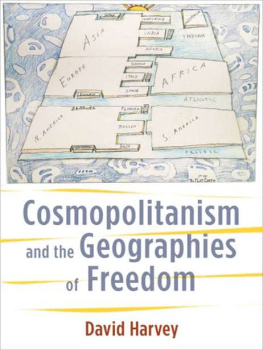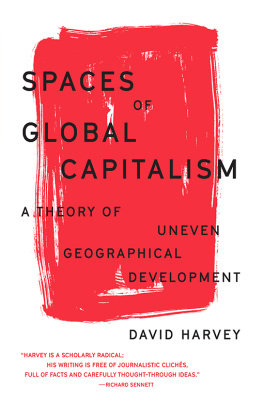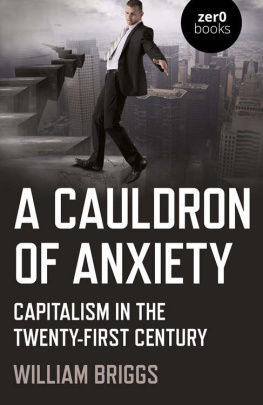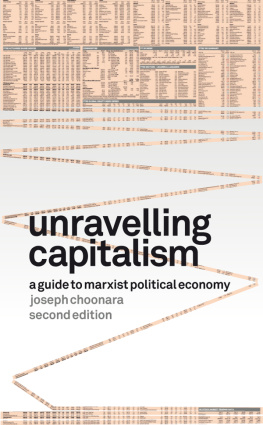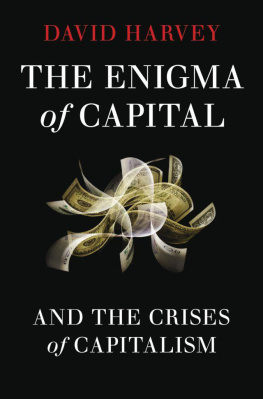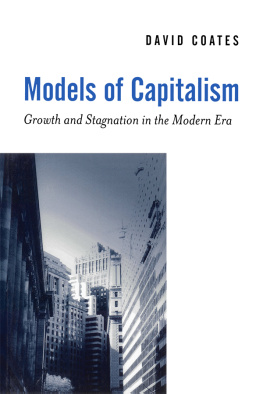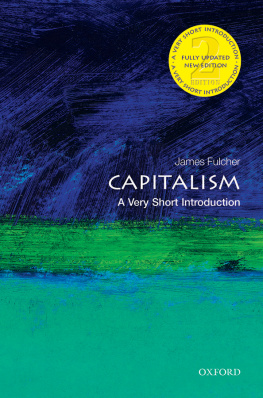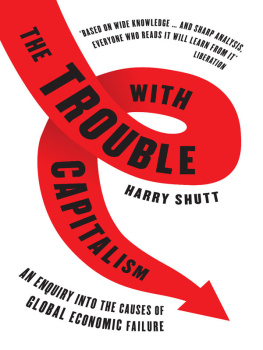Seventeen Contradictions and the End of Capitalism
ALSO BY DAVID HARVEY
The Limits to Capital (1982)
The Condition of Postmodernity (1989)
The New Imperialism (2003)
A Brief History of Neoliberalism (2005)
Spaces of Global Capitalism (2006)
The Communist Manifesto: New Introduction (2009)
Cosmopolitanism and the Geographies of Freedom (2009)
Social Justice and the City: Revised Edition (2009)
A Companion to Marxs Capital (2010)
The Enigma of Capital (2010)
Rebel Cities: From the Right to the City to the Urban Revolution (2012)
A Companion to Marxs Capital, Volume Two (2013)
Seventeen Contradictions and the End of Capitalism
David Harvey


Oxford University Press is a department of the University of Oxford.
It furthers the Universitys objective of excellence in research, scholarship, and education by publishing worldwide.
Oxford New York
Auckland Cape Town Dar es Salaam Hong Kong Karachi
Kuala Lumpur Madrid Melbourne Mexico City Nairobi
New Delhi Shanghai Taipei Toronto
With offices in
Argentina Austria Brazil Chile Czech Republic France Greece
Guatemala Hungary Italy Japan Poland Portugal Singapore
South Korea Switzerland Thailand Turkey Ukraine Vietnam
Oxford is a registered trade mark of Oxford University Press
in the UK and certain other countries.
Published in the United States of America by
Oxford University Press
198 Madison Avenue, New York, NY 10016
David Harvey 2014
All rights reserved. No part of this publication may be reproduced, stored in a retrieval system, or transmitted, in any form or by any means, without the prior permission in writing of Oxford University Press, or as expressly permitted by law, by license, or under terms agreed with the appropriate reproduction rights organization. Inquiries concerning reproduction outside the scope of the above should be sent to the Rights Department, Oxford University Press, at the address above.
You must not circulate this work in any other form
and you must impose this same condition on any acquirer.
Cataloging-in-Publication data is on file with the Library of Congress
ISBN 978-0-19-936026-0
9 8 7 6 5 4 3 2 1
Printed in the United States of America on acid-free paper
To John Davey
In recognition of his wise counsel and support for almost everything I have ever published
Contents
Prologue
The Crisis of Capitalism This Time Around
Introduction
On Contradiction
Conclusion
Prospects for a Happy but Contested Future: The Promise of Revolutionary Humanism
Epilogue
Ideas for Political Praxis
Crises are essential to the reproduction of capitalism. It is in the course of crises that the instabilities of capitalism are confronted, reshaped and re-engineered to create a new version of what capitalism is about. Much gets torn down and laid waste to make way for the new. Once-productive landscapes are turned into industrial waste-lands, old factories are torn down or converted to new uses, working-class neighbourhoods get gentrified. Elsewhere, small farms and peasant holdings are displaced by large-scale industrialised agriculture or by sleek new factories. Business parks, R&D and wholesale warehousing and distribution centres sprawl across the land in the midst of suburban tract housing, linked together with clover-leafed highways. Central cities compete with how tall and glamorous their office towers and iconic cultural buildings might be, mega-shopping malls galore proliferate in city and suburb alike, some even doubling as airports through which hordes of tourists and business executives ceaselessly pass in a world gone cosmopolitan by default. Golf courses and gated communities pioneered in the USA can now be seen in China, Chile and India, contrasting with sprawling squatter and self-built settlements officially designated as slums, favelas or barrios pobres.
But what is so striking about crises is not so much the wholesale reconfiguration of physical landscapes, but dramatic changes in ways of thought and understanding, of institutions and dominant ideologies, of political allegiances and processes, of political subjectivities, of technologies and organisational forms, of social relations, of the cultural customs and tastes that inform daily life. Crises shake our mental conceptions of the world and of our place in it to the very core. And we, as restless participants and inhabitants of this new emerging world, have to adapt, through coercion or consent, to the new state of things, even as we, by virtue of what we do and how we think and behave, add our two cents worth to the messy qualities of this world.
In the midst of a crisis it is hard to see where the exit might be. Crises are not singular events. While they have their obvious triggers, the tectonic shifts they represent take many years to work out. The long-drawn-out crisis that began with the stock market crash of 1929 was not finally resolved until the 1950s, after the world had passed through the Depression of the 1930s and the global war of the 1940s. Likewise, the crisis whose existence was signalled by turbulence in international currency markets in the late 1960s and the events of 1968 on the streets of many cities (from Paris and Chicago to Mexico City and Bangkok) was not resolved until the mid-1980s, having passed through the early 1970s collapse of the Bretton Woods international monetary system set up in 1944, a turbulent decade of labour struggles in the 1970s and the rise and consolidation of the politics of neoliberalisation under Reagan, Thatcher, Kohl, Pinochet and, ultimately, Deng in China.
With the benefit of hindsight it is not hard to spot abundant signs of problems to come well before a crisis explodes into full view. The surging inequalities in monetary wealth and incomes of the 1920s and the property market asset bubble that popped in 1928 in the USA presaged the collapse of 1929, for example. Indeed, the manner of exit from one crisis contains within itself the seeds of crises to come. The debt-saturated and increasingly deregulated global financialisation that began in the 1980s as a way to solve conflicts with labour by facilitating geographical mobility and dispersal produced its denouement in the fall of the investment bank of Lehman Brothers on 15 September 2008.
It is, at the time of writing, more than five years since that event, which triggered the cascading financial collapses that followed. If the past is any guide, it would be churlish to expect at this point any clear indications of what a revivified capitalism if such is possible might look like. But there should by now be competing diagnoses of what is wrong and a proliferation of proposals for putting things right. What is astonishing is the paucity of new thinking or policies. The world is broadly polarised between a continuation (as in Europe and the United States) if not a deepening of neoliberal, supply-side and monetarist remedies that emphasise austerity as the proper medicine to cure our ills; and the revival of some version, usually watered down, of a Keynesian demand-side and debt-financed expansion (as in China) that ignores Keyness emphasis upon the redistribution of income to the lower classes as one of its key components. No matter which policy is being followed, the result is to favour the billionaires club that now constitutes an increasingly powerful plutocracy both within countries and (like Rupert Murdoch) upon the world stage. Everywhere, the rich are getting richer by the minute. The top 100 billionaires in the world (from China, Russia, India, Mexico and Indonesia as well as from the traditional centres of wealth in North America and Europe) added $240 billion to their coffers in 2012 alone (enough, calculates Oxfam, to end world poverty overnight). By contrast, the well-being of the masses at best stagnates or more likely undergoes an accelerating if not catastrophic (as in Greece and Spain) degradation.
Next page



